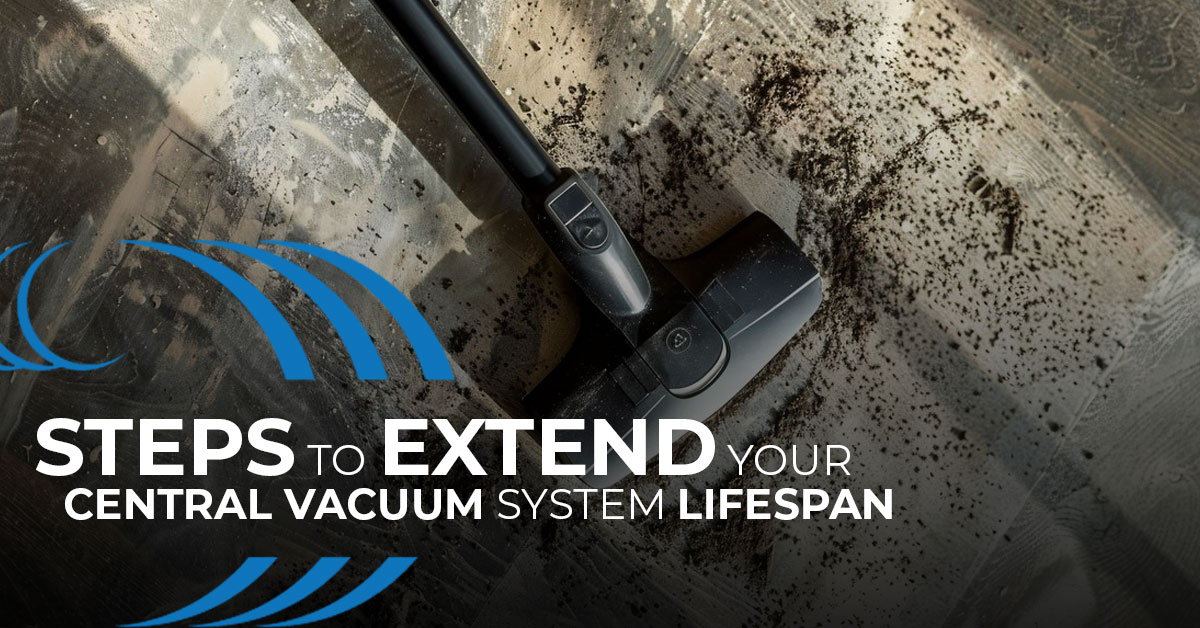
Boosting Productivity in Office Buildings with Central Vacuum
In today’s fast-paced work environment, maintaining a clean and organized office space is crucial for productivity. Office buildings often struggle with keeping their premises clean

Central vacuum systems have become a popular choice for homeowners seeking a powerful, convenient, and quiet cleaning solution. However, like any other home appliance, these systems need regular maintenance to stay in good working condition and serve you for years to come. This article will guide you on how to extend the lifespan of your central vacuum system.
The first step in extending the lifespan of your vacuum systems is understanding how to maintain them. Regular maintenance not only keeps your system running smoothly but also ensures it operates at peak efficiency.
One of the critical aspects of central vacuum system maintenance is checking the motor brushes approximately every five years. These brushes are responsible for conducting electrical current within the motor, and over time, they can wear down. Therefore, regular checks can help detect and replace worn brushes, preventing potential motor damage.
Another crucial maintenance task is emptying the accumulated dirt regularly. Dust pouches or bags in central vacuum systems should ideally be emptied once every 3 to 4 months, depending on the frequency of usage. Overfilled bags or canisters can cause the system to work harder than necessary, reducing its efficiency and potentially shortening its lifespan.
Cleaning central vacuum systems is not just about emptying the dust pouches or bags. The filters, which play a critical role in trapping dust, allergens, and small particles, also need regular attention.
For filtered systems, clean or change the filter two to four times a year. If the filters are reusable, clean them with a solution of liquid soap and water, rinse thoroughly, and allow them to dry before reinserting them. Regular filter maintenance ensures your vacuum system continues to operate effectively and efficiently.
How you use your central vacuum system also impacts its lifespan. Avoid vacuuming large, hard objects that could damage the system. Also, avoid vacuuming liquids unless your system is designed to handle wet debris, as this can lead to electrical issues or other damage.
Moreover, make sure to use the right attachments for different cleaning tasks. Using the wrong tool can result in poor cleaning results and potentially harm the system.
In addition to regular maintenance and efficient use, there are other ways to increase the longevity of your central vacuum system. One of these is to ensure the system is installed correctly. Poor installation can lead to numerous problems, from reduced suction power to system failures.
Furthermore, if you notice any issues with your system, such as reduced suction power or strange noises, it’s essential to address them promptly. Ignoring these signs could lead to more serious problems over time, ultimately shortening the system’s lifespan.
In conclusion, extending the lifespan of your central vacuum system involves regular maintenance, efficient use, and prompt attention to any issues. By following these steps, you can keep your system in top shape and enjoy its benefits for many years to come.

In today’s fast-paced work environment, maintaining a clean and organized office space is crucial for productivity. Office buildings often struggle with keeping their premises clean

Central vacuums in animal shelters & vet clinic: Explore how these systems boost hygiene, efficiency, and air quality.

In the world of home entertainment, a home theater is a luxury that many homeowners dream of. It’s an immersive experience that brings the magic

A central vacuum system is a significant investment that promises convenience, powerful suction, and improved indoor air quality. However, choosing the right central vacuum hose
Our home automation products are at the forefront of technology, offering a blend of convenience, security, and efficiency. As a Homewave dealer, you’ll be part of a network transforming homes into smart, futuristic spaces.
Embark on this rewarding journey with us and leverage the power of innovative technology.
Please fill out this form and become a Homewave Dealer.